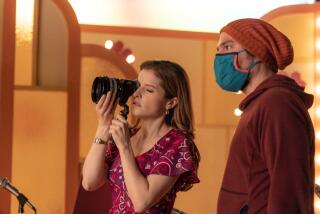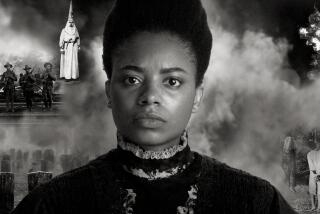Word of Mouth: ‘Winter’s Bone’ another bold choice for Roadside Attractions
- Share via
“Winter’s Bone” is no easy sell at the multiplex.
Adapted from an acclaimed but little-read Daniel Woodrell novel, the low-budget movie unfolds in Missouri’s impoverished Ozarks, its sometimes violent main characters subsist on methamphetamine and the R-rated film’s protagonist is a 17-year-old girl played by the unheralded actress Jennifer Lawrence.
Yet as soon as Roadside Attractions saw “Winter’s Bone” at January’s Sundance Film Festival, it knew it had to have the film that would go on to win the festival’s top prize.
A torrent of specialized film companies has collapsed in the last few years, and many of the few companies still in business are either steering more toward bigger-budget productions (Fox Searchlight, Focus Features) or largely avoiding movie theater releases for video-on-demand premieres (IFC Films, Magnolia Pictures). Roadside Attractions, which was formed in late 2003, believes it still makes sense to acquire movies at film festivals for often substantially less than $1 million and bring them to theaters with judicious advertising.
It’s only inside movie auditoriums, Roadside Attractions believes, that critics and audiences can turn off the world and make movies part of the chattering class conversation. “We think we are the future of the middle space in the distribution landscape,” says Howard Cohen, who runs Roadside Attractions with Eric d’Arbeloff.
Although the company has yet to have a runaway art-house smash such as “Little Miss Sunshine,” “Crouching Tiger, Hidden Dragon” or “Brokeback Mountain,” Roadside Attractions has released several lucrative specialized films, including 2007’s historical drama “Amazing Grace” (domestic box office: $21.3 million) and its first film, 2004’s fast-food cautionary tale “Super Size Me” ($11.5 million).
Even though it struggled to attract moviegoers, Roadside Attractions’ dolphin slaughter story, “The Cove,” won this year’s Oscar for documentary feature. The company’s Vogue magazine feature, “The September Issue,” was among the highest-grossing nonfiction films of 2009, with ticket sales in excess of $3.8 million.
With a staff of just 16 employees and an annual overhead of less than $2 million, Roadside Attractions knows that it can’t compete in festival bidding wars, finance its own productions or buy tons of television ads to promote its titles.
“We were never financed to have a massive amount of money to spend,” D’Arbeloff says of the privately held company. But thanks to a partnership with Lionsgate Films (which was just renewed for three more years; Lionsgate is also a minority investor in the company), Roadside Attractions has access to Lionsgate’s ancillary distribution channels, including its television and video deals.
“Winter’s Bone,” which opens opposite “The A-Team” and “The Karate Kid” on June 11 in Los Angeles and New York, will present an interesting test of the Roadside Attractions business model and whether highbrow moviegoers will patronize an art film in the summer movie season.
Soon after the company’s acquisitions head, Dustin Smith, saw writer-director Debra Granik’s feature in Park City, Utah, the Roadside Attractions team made clear to “Winter’s Bone” sales agent Josh Braun that it wanted the movie.
Given how well the film played at the festival (“Winter’s Bone” would go on to win the festival’s Grand Jury and its screenwriting prizes), Roadside Attractions was not the only prospective buyer, with IFC, Magnolia, Apparition, Oscilloscope Laboratories, the Samuel Goldwyn Co. and Sony Pictures Classics all vying for the film.
Some of the distributors put more money on the table than Roadside Attractions (which made a bid of around $500,000) for the film’s North American rights, but Braun says the filmmakers were impressed by Cohen and D’Arbeloff’s thoughtful passion for the movie, coupled with their plans to market “Winter’s Bone” as a critically acclaimed genre film — a highbrow Sundance version, in a way, of “Deliverance,” an edge-of-your-seat thriller set in a strange and dangerous world.
The film’s trailer showcases its critical plaudits but also tries to capture the perilous, central quest by a young girl (Lawrence) to find her bail-skipping father and save her family home.
“That was part of the pitch that really excited us,” Braun says. “Did other distributors come back and offer more? Yes. But they have such a great track record,” says Braun, who also sold “The Cove” to Roadside Attractions.
To generate early buzz around “Winter’s Bone,” Roadside Attractions has relied on as much free publicity as possible. Granik has been booked on a 10-city promotional tour, and the company sent the film to more than a dozen regional film festivals, showing “Winter’s Bone” in Boston, Dallas, San Francisco, Seattle, Kansas City and Palm Beach, Fla.
Like any small company involved in a mercurial business, Roadside Attractions has suffered a few missteps. The company bought the 2007 Frank Langella literary drama “Starting Out in the Evening” for $350,000 and then spent about $1.5 million selling the film and chasing an Academy Award nomination for Langella. The movie neither got an Oscar nomination nor played beyond New York.
Cohen and D’Arbeloff, who have been life partners for 15 years, know that they work in a perilous business in troubled times.
“What’s the key to profitability right now? To make sure that the film performs well enough theatrically that you are not deep in the red when you come out of it,” Cohen says.
More to Read
The biggest entertainment stories
Get our big stories about Hollywood, film, television, music, arts, culture and more right in your inbox as soon as they publish.
You may occasionally receive promotional content from the Los Angeles Times.











